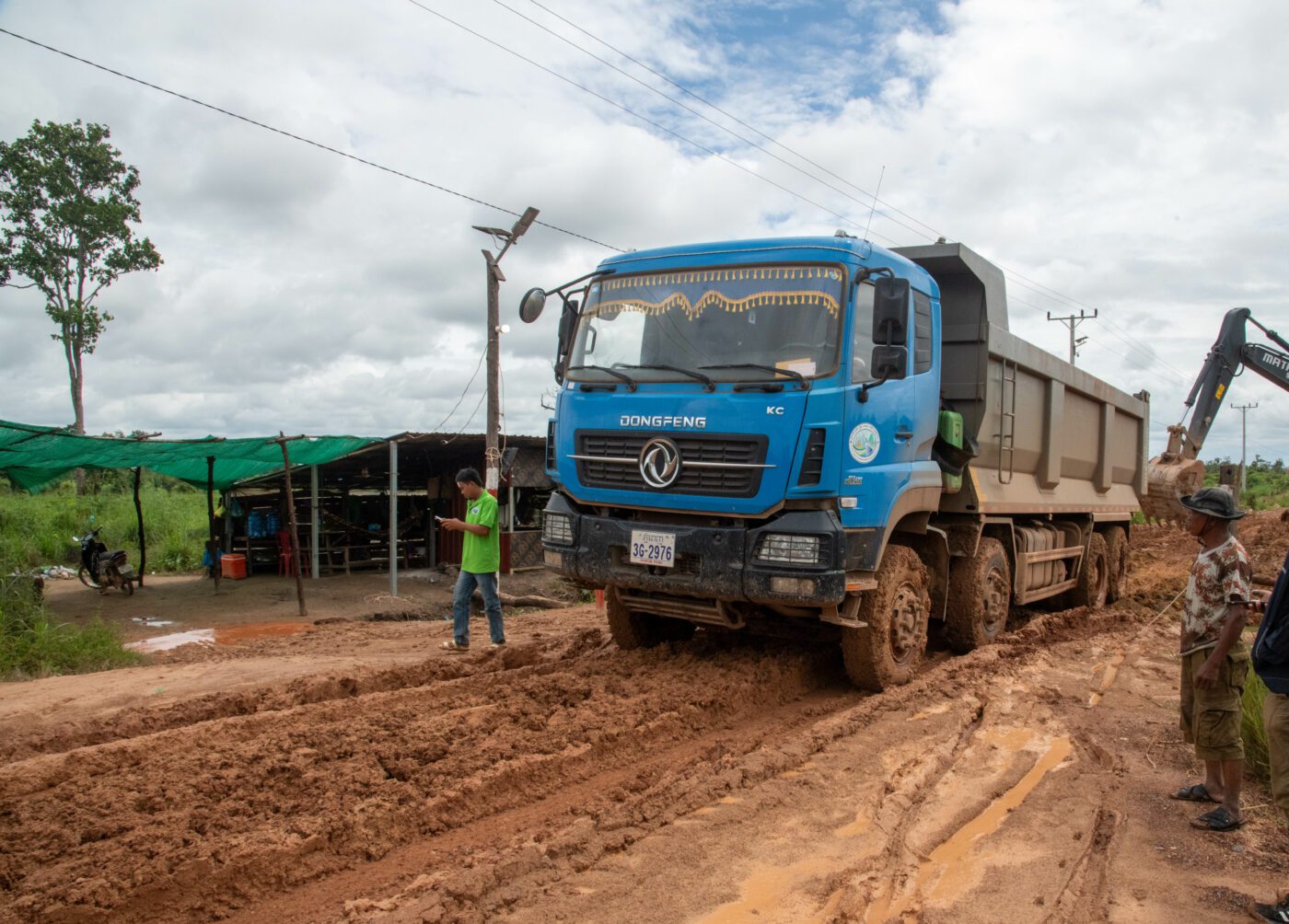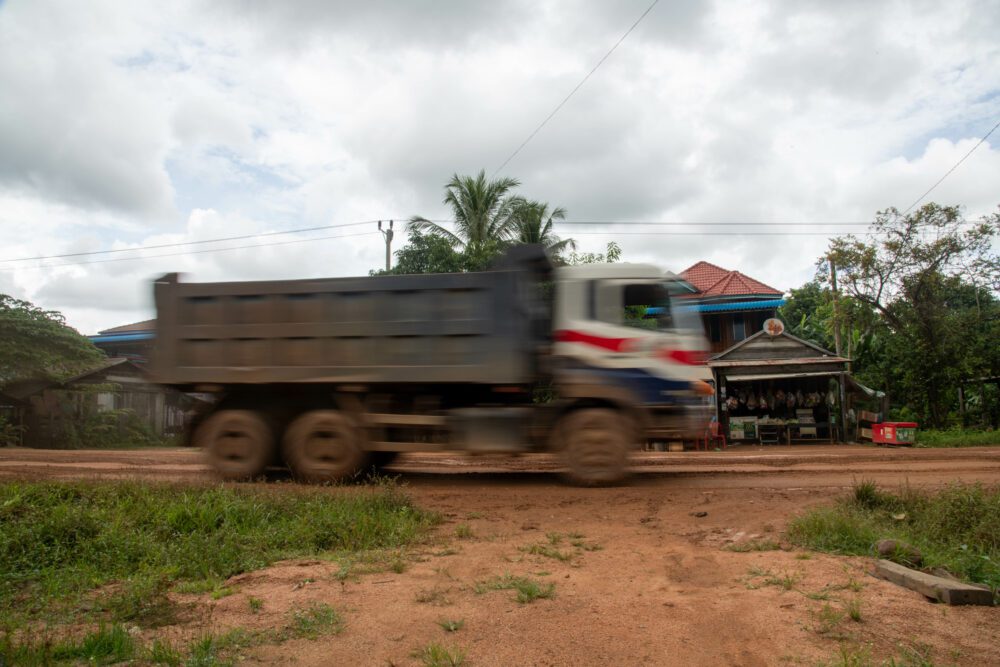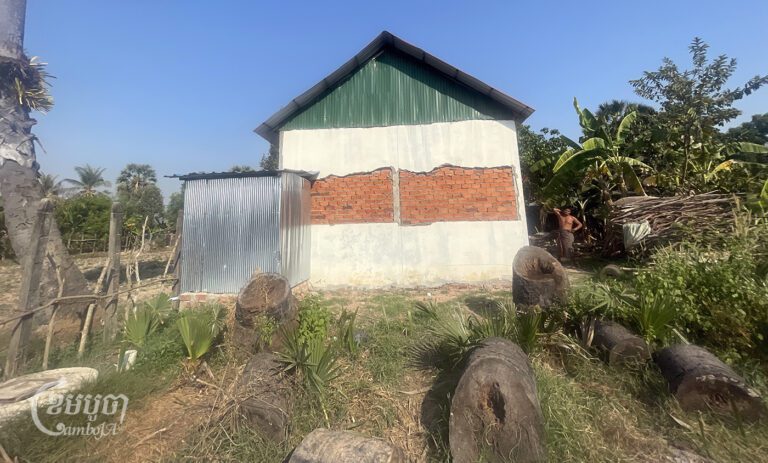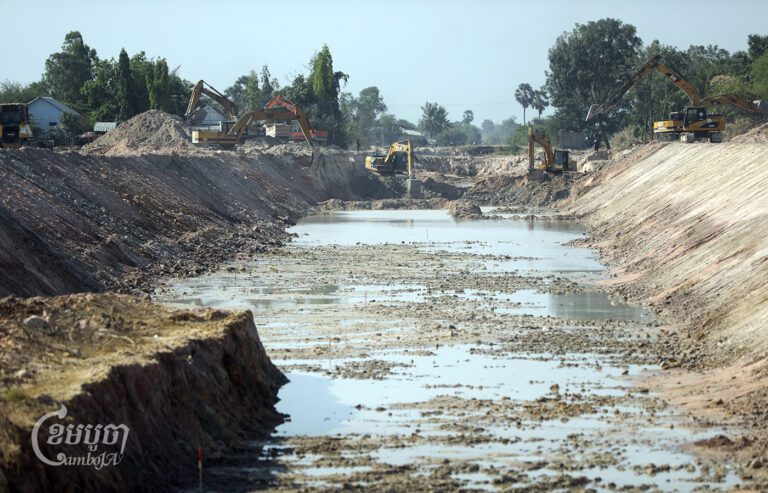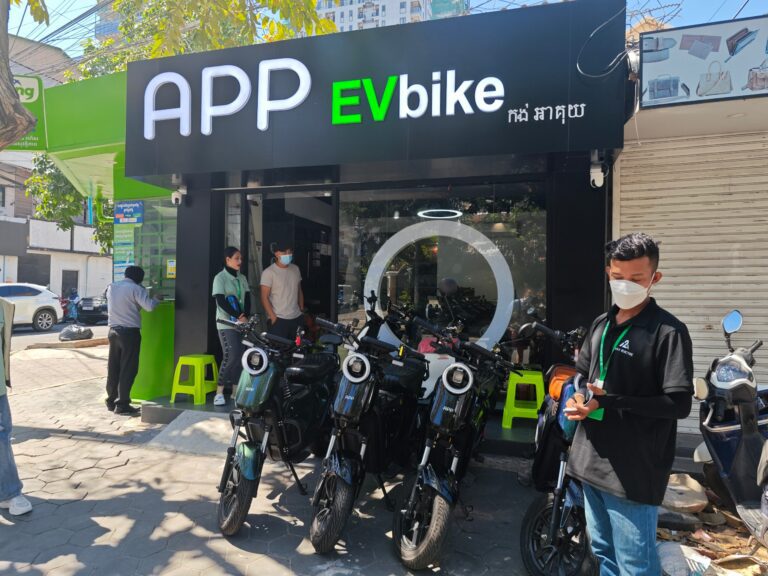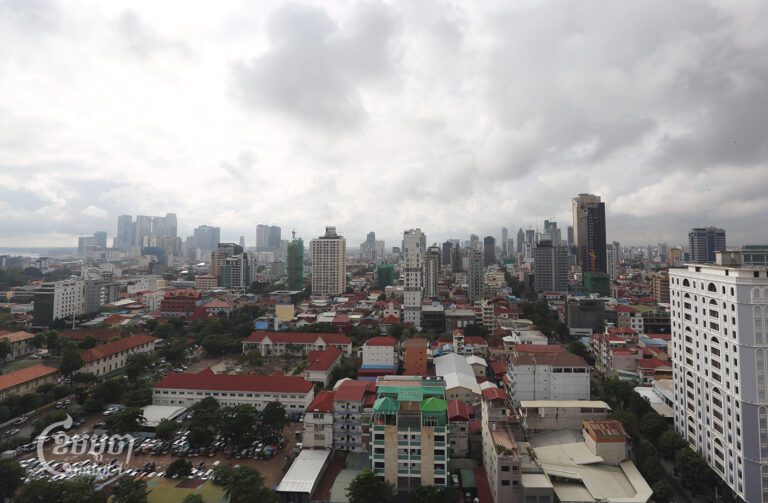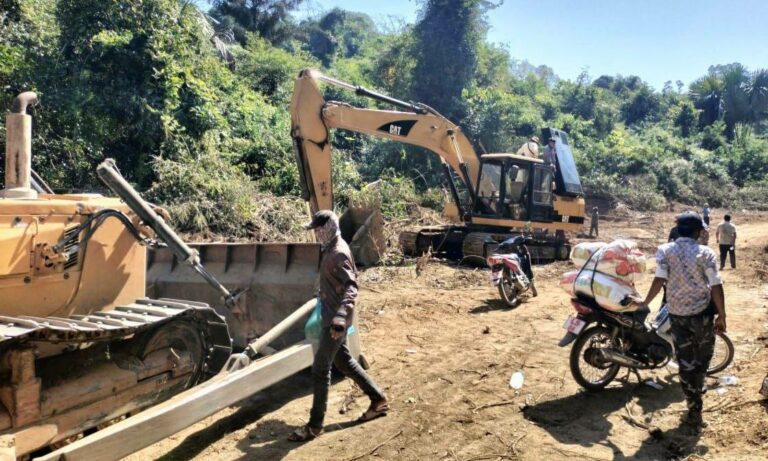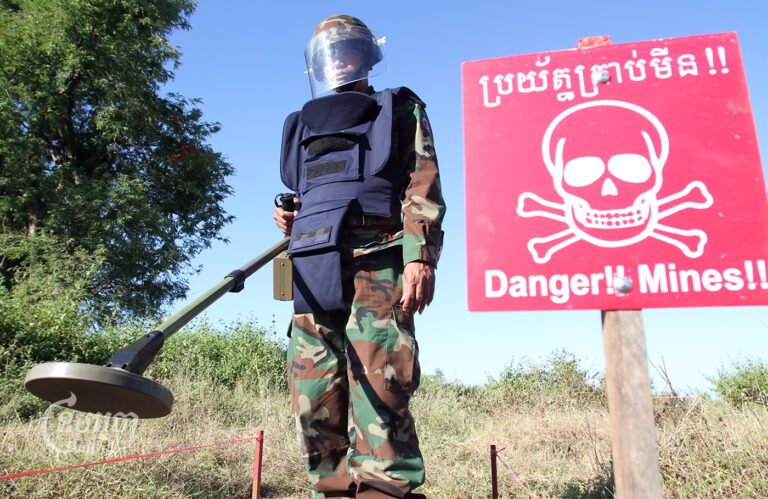Rovieng, Preah Vihear – Before 10:30 a.m. on a cloudy Sunday morning between 20-30 hulking trucks gather in formation, ready to make a mad dash to a multipurpose port in Kampong Chhnang. Drivers lounge in their cabs, waiting for excavators and steam rollers to clear mud from the trail, and say they are hauling iron ore mined by Global Green Energy Development, a company with ties to sanctioned tycoon Try Pheap. The company exports iron to Vietnam by means of Try Pheap’s new multipurpose shipping port.
Once free of the construction gridlock, the trucks hurtle through Preah Vihear province, first passing through Rovieng district where residents have dealt with the onslaught of heavy vehicles which first began in June has torn up the community road. The heavy vehicles and massive tires have dug deep ruts and churned up thick monsoon mud, and when they pass on dry days, dust clouds hover in their wake.
More than ten community members expressed frustration their roads are ruined, concern their land may be taken if Global Green expands and fear for their children walking to school, especially after one teenaged boy was killed by an unidentified truck this year.
Global Green holds a letter from the Council of Ministers permitting the export of iron, but CamboJA was unable to obtain any exportation licenses or record of iron ore exports from the Kingdom, suggesting export tariffs are not being paid, even as local villagers pay the price of damaged infrastructure.
“The road has been damaged this year,” said San Sun, 68, a Rik Reay commune resident. “The trucks have caused a lot of ruts and holes on the road.”
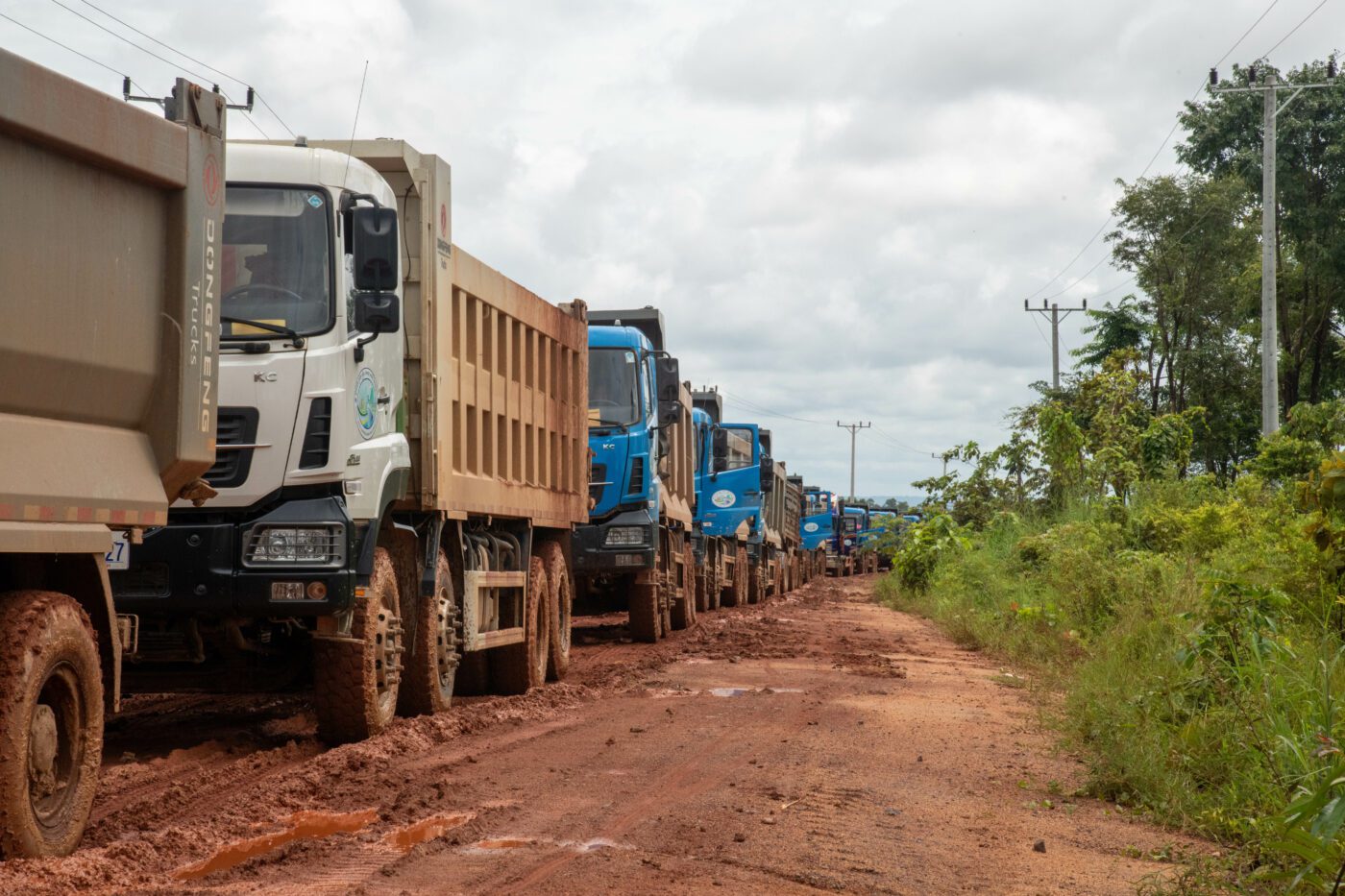
Iron export oddities
The company is licensed to mine and remove raw materials, according to documents provided by Preah Vihear provincial spokesperson Nop Vuthy. He also shared a January 20 approval letter for Global Green to export iron ore abroad from the Council of Ministers, which stated that Global Green could export iron ore. But the approval letter specifically notes that the company is “accountable for repairing the road transportation that the company uses”, suggesting that damage to Roveing’s roads were identified in an impact assessment and accepted by the government.
The skeletal wordpress website for Global Green proclaims they are “the only Cambodian company with approval,” but no other government agency was able to provide any documentation regarding Global Green’s exportation of iron ore.
Exportation guidelines for Cambodia indicate that to have exports properly filed, the exporter needs to be registered with various ministries and have an export permit as well as a tax identification number. No relevant documents to this process were provided to CamboJA despite multiple requests sent to the relevant government agencies.
Further emails, calls, and Telegram messages to Global Green for comment went unanswered.
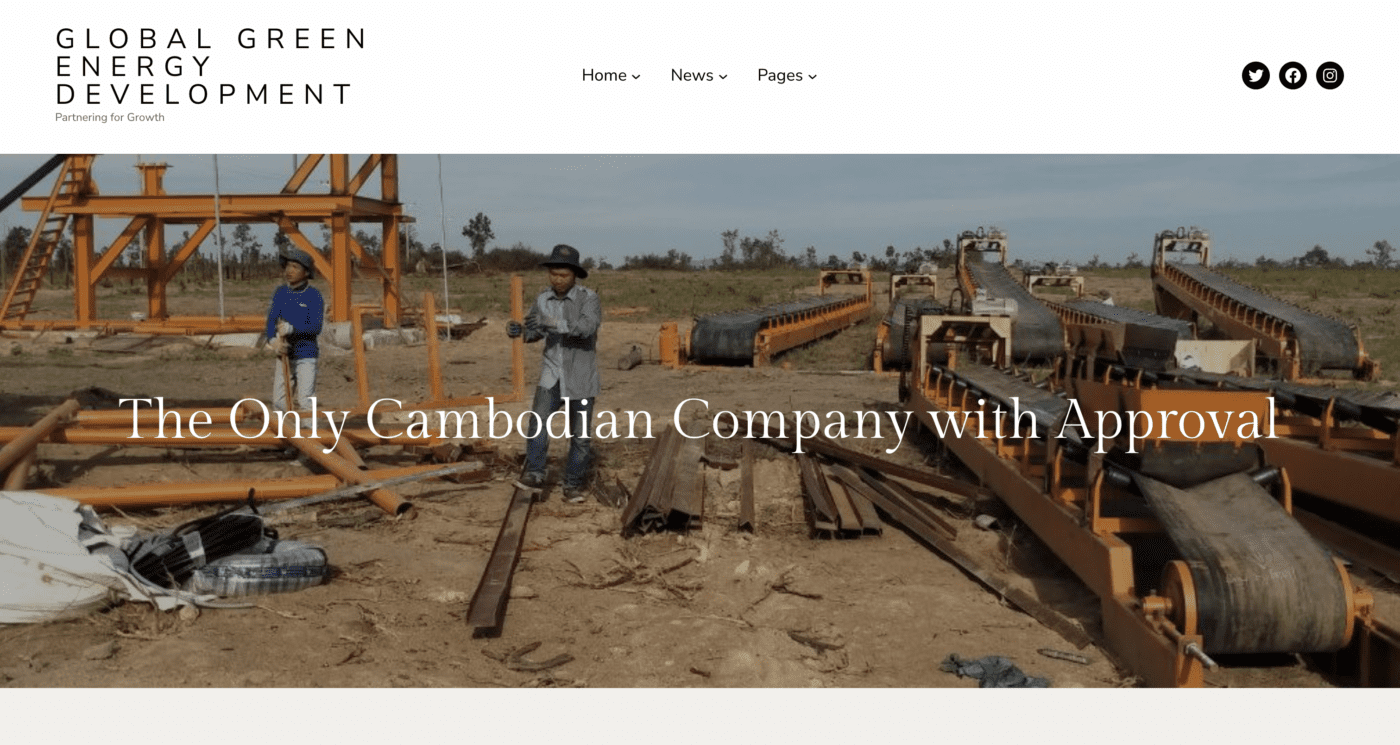
Iron ore is not listed among Global Green’s activities on the Ministry of Commerce’s business register. Instead, the company’s business categories include the quarrying of stone, sand and clay as well as the wholesale of various fuel products and construction materials.
Global Green’s industrial mining license, provided by the Preah Vihear provincial spokesperson, was transferred from another company, Hua Rong Seng International Mining Co. LTD, in April. According to Cambodia’s business registry, Hua Rong Seng was only incorporated last year in September, has a total of seven employees and lists its sole business activity as the wholesale of construction materials and tools. This concession, unlisted on public databases, even included an iron ore exploration concession within the northern part of Prey Lang Wildlife Sanctuary.
According to the Observatory of Economic Complexity, a US-based online data visualization and distribution platform, Cambodia has historically rarely exported iron ore. The only available data, from 2018, states that Cambodia exported just $313 worth of iron — a little more than two tons at the current market prices and substantially less than that amount held in one Global Green truck, according to drone footage and the company’s truck drivers.
William and Marshall Strategy, a Bulgaria-based think tank for global market statistics, also confirmed there were no reported iron ore exports from Cambodia in the past three years. Representatives from both firms told CamboJA over email this is either because the data doesn’t exist or because Cambodian customs is not releasing any iron ore exportation data.
Kun Nhim, director general of the General Department of Custom and Excise, could not be reached for comment.
Records from Panjiva, a global trade and market insights database based in New York, indicate that in June and July Global Green exported just short of $700,000 to Mekong Minerals Investment in Vietnam, a company registered in Ho Chi Minh’s Vincom tower.
One truck driver, who wished to remain anonymous, told CamboJA from the cab of his vehicle that 30 trucks leave Koh Keo mountain a day. Five drivers confirmed they were carrying the iron ore to the multipurpose port in Kampong Chhnang which began construction earlier this year. It is being built by KLP.T Transportation Co Ltd, owned by the tycoon Try Pheap, who was sanctioned in 2019 by the US Treasury for illicitly selling off Cambodia’s natural resources. Three Try children were all former directors of Global Green until the end of 2021 according to the Ministry of Commerce’s records.
Pheap’s daughter, Try Dalin, was replaced by Hann Sinath in December, 2021 as the Chairman of the Board of Directors. Sinath is also listed as the active director of Try Palace Resorts according to the Ministry of Commerce, and Mongabay has posited that Sinath could be standing in as a front for the sanctioned Try family.
Global Green has previously been associated with extensive sand dredging operations, and some of the company’s barges are now being used for the iron trade. Drone footage, obtained by CamboJA, shows sand barges at the multipurpose port being filled with iron ore from Koh Keo mountain. These barges then continue on to Vietnam, according to Global Green assistant Hong Phanith, who identified himself and spoke to CamboJA after answering a phone number listed on the company’s website. Phanith said the iron ore is then taken to the Cambodia-Vietnamese border at Kaom Somnor village in Kandal province, but he was unclear on whether the company had all the required documents to export and was in compliance with export tariffs.
“Maybe [Global Green] has an exportation license, I think they might have, I don’t know where they export the iron ore, but I know they export via Vietnam,” said Phanith. “I think they already pay the tax (exportation), if they don’t pay the tax, the state won’t allow them to export.”
Kong Vibol, the director of the General Department of Taxation, did not respond to calls or requests for comment sent over Telegram.
Rough Road to Repair
When Global Green trucks blast down the 20 kilometers between the mine and Rovieng, dust clouds swirl around roadside stalls and locals veer their mopeds to the side of the heavily rutted road.
One roadside stall operator between the mine and Rovieng told CamboJA it feels like 100 trucks pass per day. She said that when drivers stop to rest and buy food they complain the company wants them to carry 70 tons of ore a day, but they can only carry 50 to avoid getting stuck in the muddy mess of a road.
Rik Reay commune chief Peng Phoung said that the daily procession of trucks has slowed due to the wet season. He explained the trucks appeared more frequently and carried more ore when they first began using the road in June.
Several Rik Reay commune residents told CamboJA that since the company began transporting ore in June, they have worried about their safety.
“We are afraid to drive to the farm; the trucks do not give us the space to drive,” explained Sun. “The road is difficult and we are also not happy. We are worried that trucks will hit our children when they go to school.”
Two days before receiving a scholarship from his school, 16-year-old Khum Bunlang was struck by a large truck and killed walking home from school on September 2, according to his family.
“The truck owner paid $3,000 in compensation, but I had to distribute some money to police and some to doctors, so there was only a little money left,” said the boy’s father, Chhi Lim.
His family is not sure which company the truck driver worked for and Bunlang’s brother, who was with him when the accident occurred, could not recall if the truck had Global Green’s logo. However, like their neighbors, Bunlang’s family blames the poor condition of the road on the mining company’s vehicles.
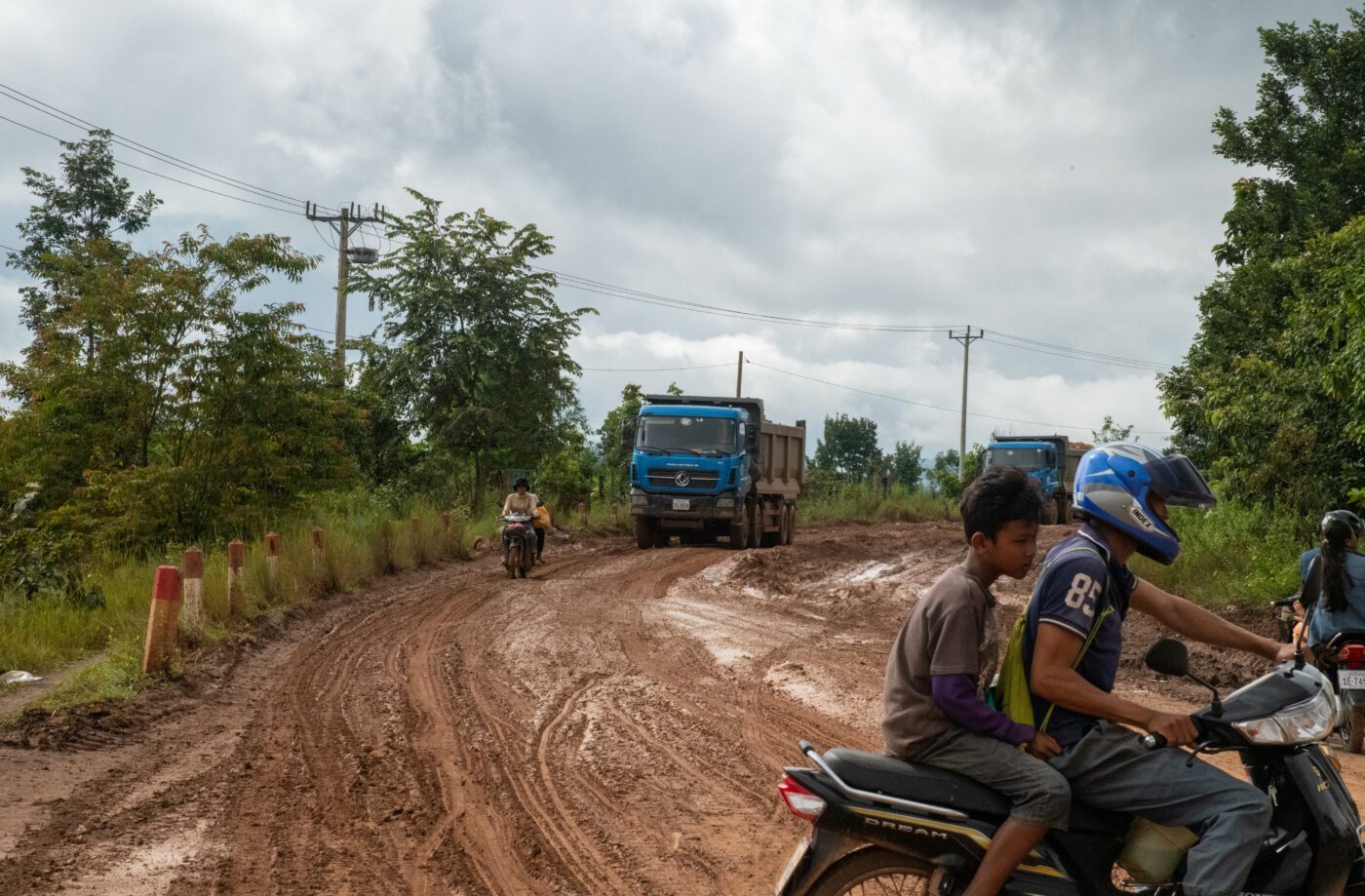
Lon Chorvong, a neighbor of Bunlang’s family, explained that the weight and speed of the iron ore trucks has been damaging the road.
“I heard a rumor that once the mining operation is completed, the company or the state will repair the road,” Chorvong said with a chuckle. “I do not know when the company will end mining, it has no end.”
According to the industrial mining license filed with the Department of Mines and Energy Preah Vihear Province, the Global Green mine can operate for 7 years, from February 15, 2023, to February 15, 2030. The Council of Ministers’ letter states Global Green has to fix the roads, but does not specify a timeline for the repairs. Global Green’s employee Phanith claimed that the company would fix it whenever it needs repairing, even though residents say the road currently needs repairing now.
“I know that the company has to have meetings with the Public Works and Transport Ministry and provincial department to evaluate the road,” Phanith said. “The company will repair it, but now it is the rainy season so it might be slow.”
Vuthy, the Preah Vihear’s provincial spokesperson, confirmed to CamboJA that it is Global Green’s responsibility to repair approximately 32 kilometers of road from Phnom Dek to the mine. He said that the Department of Public Works was currently focused on repairing a stretch of road in another part of the province.
Koh Keo Mountain Mine
At the mine, security guards manning small checkpoints declined to offer any comment. At the first gate the guards hesitantly admitted they worked at Global Green and at another entrance near the long line of iron ore trucks one guard was significantly more animated and aggressive.
“No, I do not work for anyone!” he shouted while wearing a neon green Global Green collared shirt and waving Global Green trucks through. “Go back, when the company sends extra security guards, you will have a difficult time leaving.”
Community members were allowed past these checkpoints, but one man driving a kouyun who did not want to share his name for safety concerns said they are restricted access.
“They do not let us go there (Koh Keo)!” We are not allowed to enter, because there are security guards from the defense company in front,” said the kouyun driver before weaving his tractor in between the train of ore trucks with a dejected expression.
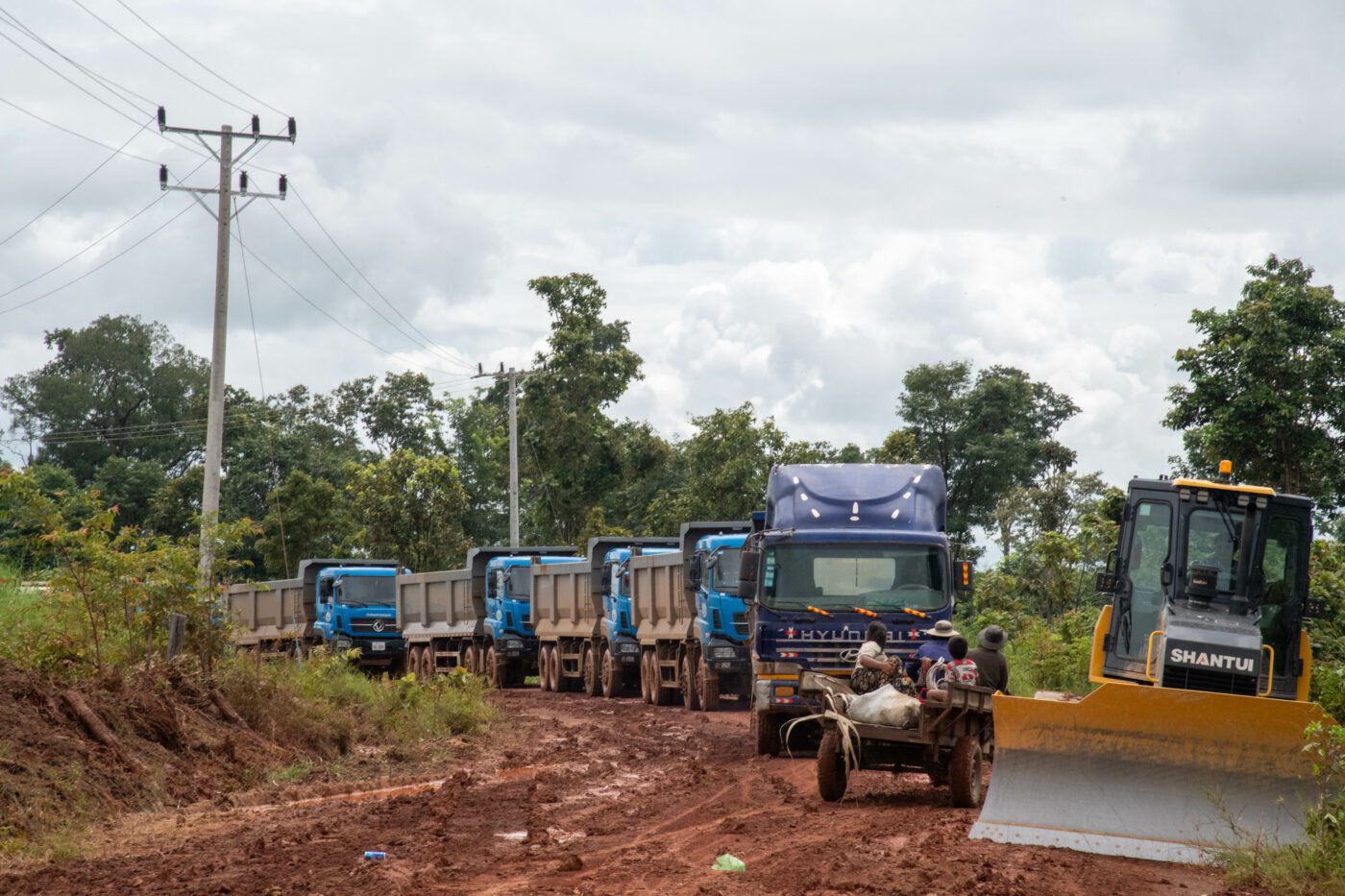
Some community members have farms adjacent to the mountain and the mine and are concerned they may lose land. They heard the rumor that the company continued finding iron around the citizen’s farm near a mountain, which made them worried about losing their land.
“People depend on these [farms], so if they take those farms, they will have nothing left,” Sun said.
Another villager, Soeun San, said that since the company started its mining operations earlier this year, it has been difficult for the villagers to go to the farm because the company has not allowed them to enter their farmland.
“I don’t like this company because they do not allow people to farm on the land near the mountain. How can we be happy?” San said.
Rik Reay Commune Chief Phoung has brought concerns involving land and the condition of the road to authorities and says that while he is in communication with the company, little has come of it.
“I told the district authorities, and the district governor also told the provincial governor to make the company or the truck drivers slow down while driving in the village,” said Phoung. “About 25 families were worried because they were afraid the company would take the land and not compensate them.”
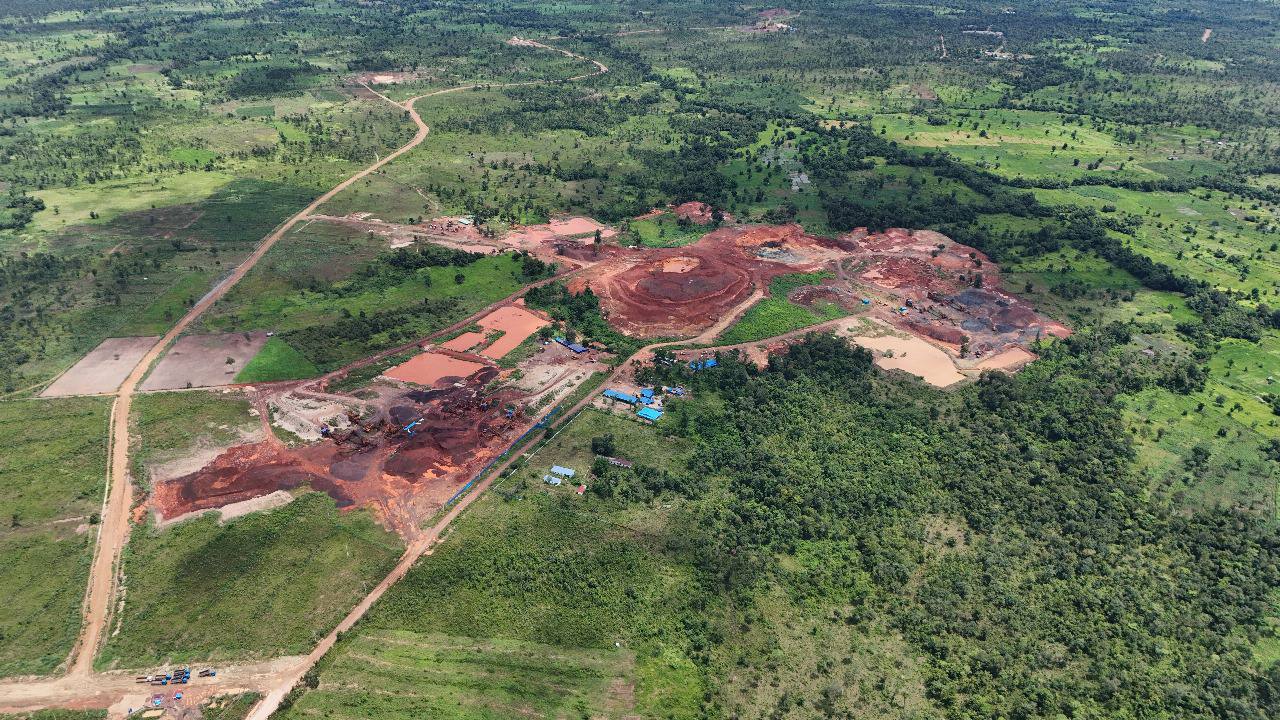
The company pays $1,000 per hectare of farmland in compensation, which is about the going rate according to Phoung. But the land sales are hardly an act of free will — when the mine wants the land, they take it and compensate farmers later, Phoung says.
“Sometimes citizens themselves are just worried, the company won’t take the land,” Phanith from Global Green said.
For the people living along the main road, the barrage of trucks battering the road remains an active problem.
Some of the trucks returning to Koh Keo mountain were loaded with stone, which Phanith said is used for fixing the road, but no construction had yet commenced upon CamboJA’s visit in mid-September. One driver who didn’t disclose his name explained that the construction materials were actually being used to develop roads within the mine compound, not the community road.
Heavy construction vehicles were only clearing mud right outside the mine checkpoint before the turnoff for the community road. Meanwhile on the road to Rovieng, Honda dreams slide through mud ruts and are bogged down in massive potholes, while fully loaded trucks spray dust and empty trucks coming back from Kampong Chhnang bang their way through town, splashing through deep puddles.
